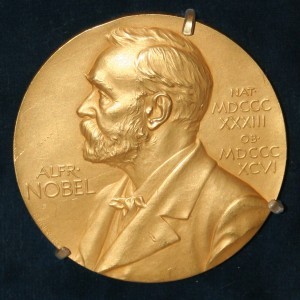
Meanwhile, SINA overviews the prize through China’s eyes:
Many Chinese view the Nobel Prize as a recognition of China’s rising power and status on the international stage, but to their dismay, the Nobel Prize brought more “shame” than “glory” to the country. Nobel Prizes in sciences aren’t really relevant for China for now. Nobel Peace Prize has been tainted with a political layer and converted into something of an “anti-China” prize.
That could hold the key to how Mo pushed past the oddsmakers and carried the Nobel committee’s approval. The organization saw a harsh Chinese backlash in 2010 when it awarded the Nobel.
The Washington Post explains how the country’s communist leaders “disowned the Nobel when Gao Xingjian won the literature award in 2000 for his absurdist dramas and inventive fiction. Gao’s works are laced with criticisms of China’s communist government and have been banned in China.”
Then, when jailed dissident Liu Xiaobo won the Nobel Peace Prize in 2010, the Huffington Post reported, “dozens of people who openly agreed with his views say they have been detained, roughed up, harassed or kept from leaving their homes.”
That same year, in fact that same week, Bloomberg revealed that the Nobel Foundation had begun hedging against currency fluctuation risks. “Last year, the 3 billion-krona ($448 million) foundation switched to a policy that calls for offsetting risk in all its foreign bonds and half its hedge fund investments to help protect the Nobel’s future,” the news agency said.
While the foundation has only a small percentage of its financial portfolio in Chinese investments, its money managers have seen China, despite current fiscal struggles there and worldwide, flex its financial muscles. And China’s powerful place in the global economy could perhaps affect the Nobel Foundation’s award decisions.
No doubt, Nobel authorities have also seen over the last couple of years broad coverage given to China’s repression of artist Ai Weiwei, including his 2011 arrest.
Too, international relations have been ruffled recently by China and other countries contesting rights to fish and mine in the South China Sea.
All these circumstances—ranging from Chinese authoritarian repression resulting from Nobel awards to the global fiscal strains placed on everybody—may have eased the Nobel’s decision to honor Mo’s many accomplishments over those of other deserving literary talents, and to offer what it sees as a calming international voice with its award during a turbulent time.
Source from clydefitchreport
By Roger Armbrust
Editor: Shi Liwei
